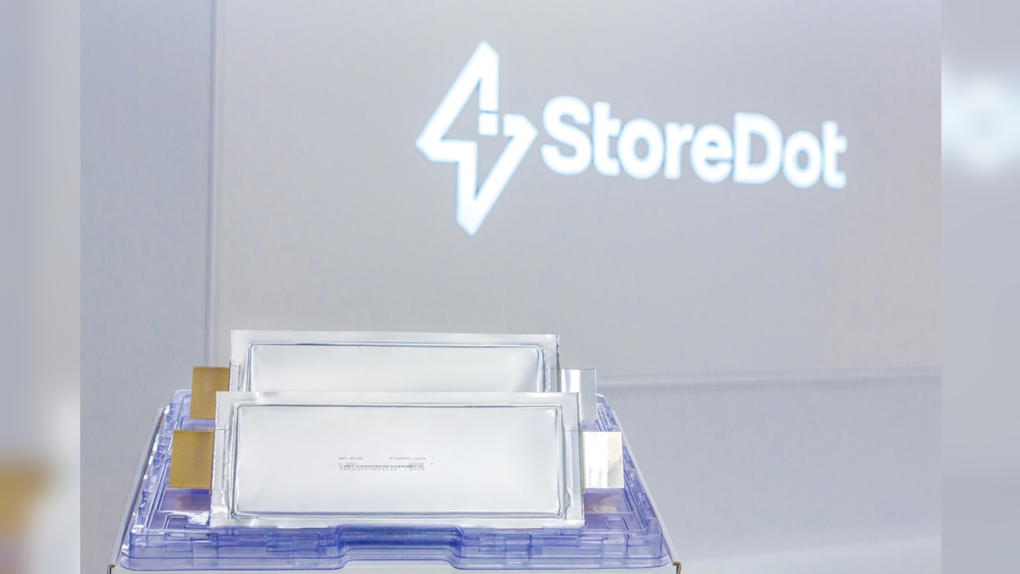After overseas breakthrough, Windsor researchers one step closer to producing EV batteries which charge in minutes
An overseas manufacturer said it has developed electric vehicle batteries which can be charged in as much time as it takes to grab a coffee from Tim Horton's — and similar batteries are expected to be made by a Windsor-based EV research group sometime this year.
StoreDot released a demonstration video earlier this week, showing an EV battery pack, powered by StoreDot’s "extreme fast charging" (XFC) silicon-dominant battery cells, charging in a fully-driveable Polestar 5 prototype from 10 to 80 per cent in approximately 10 minutes.
The accomplishment, which StoreDot said is the first of its kind in history, comes six months after the company announced it would be collaborating with the Flex-Ion Battery Innovation Centre in Windsor to produce cells which can deliver 100 miles of range in five minutes of charging in 2024.
The development of XFC electric vehicle battery cells is still expected to happen sometime this year, officials with Flex-Ion said Wednesday.
Pino Mastroianni, past president of the Windsor-Essex EV Society, said innovations like these are exactly what's needed to ensure more people consider an electric vehicle for their next car purchase.
"It will drastically change the adoption of EVs because most people's hesitancy to buy an EV are basing their concerns for long-distance travel," he said. "It's not always the case that there are lots of plugs where you can charge your vehicle while on the road."
 The Flex-Ion facility in Windsor, Ont. is seen in this undated image. (Source: Flex-Ion)
The Flex-Ion facility in Windsor, Ont. is seen in this undated image. (Source: Flex-Ion)
That's not to say EV battery charging technology hasn't made significant strides in recent years, he said.
According to Mastroianni, who has been driving an electric vehicle for the past 12 years, his current EV takes about 35 minutes to charge to around 85 per cent — but that's only at high-speed chargers along highway routes.
When charging his electric vehicle at Devonshire Mall or his home outlet, Mastroianni said it can take a couple of hours.
"Charging at the mall is what you call opportunity charging. It's not the DC fast chargers that you find along the highway which charge at much faster rates," he said.
For the masses to lean toward an electric vehicle, more technology similar to what StoreDot is offering is absolutely necessary, according to Automotive Parts Manufacturers' Association President Flavio Volpe.
But, he said, there are other barriers preventing mass consumer adoption.
 StoreDot is developing a battery that can charge from 10 per cent to 80 per cent in approximately 10 minutes. (Source: StoreDot)
StoreDot is developing a battery that can charge from 10 per cent to 80 per cent in approximately 10 minutes. (Source: StoreDot)
"Certainly, it's the cost of these vehicles," said Volpe. "Anybody who's in the market for a vehicle in the 20-to-30-thousand-dollar range doesn't have a credible option," he said.
Not all technological solutions can address every barrier, however — and anything that can make the experience of owning an electric vehicle more in line with that of a gas-powered vehicle is a plus, Volpe explained.
"I love that there's a lot of local companies working really hard on making that a reality," said Volpe.
A Windsor-based company being in a collaborative agreement with StoreDot, he added, only serves to keep the local region at the forefront of EV battery manufacturing, research and development.
"What better place to share your research, work with post-secondary institutions that are training people in this space and get a good concentration of potential customers," said Volpe.
CTVNews.ca Top Stories

DEVELOPING Slovakia's populist prime minister shot in assassination attempt, shocking Europe before elections
Slovakia's populist prime minister, Robert Fico, was shot multiple times and gravely wounded Wednesday after a political event in an attempted assassination that shocked the small country and reverberated across Europe.
Transport Canada's UFO 'lead' planned to meet with U.S. intel officials, called info requests a 'wild goose chase'
Canada's transportation department had a UFO 'lead' who tried to 'quell' media interest and planned to meet with U.S. intelligence officials.
'Very expensive lunch': Sask. driver handed a cell phone ticket for using points app in McDonald's drive-thru
A warning from a Saskatoon driver about using your fast-food app while in the drive-thru line — a trip to get some free lunch cost him a lot more than he bargained for.
'The Fly' has become notorious in France after a brazen escape. What's his criminal history?
A prisoner nicknamed “The Fly” has become notorious in France overnight after a daring and bloody escape from a prison convoy in Normandy that left two guards dead.
BREAKING Ontario's 'Crypto King' Aiden Pleterski arrested
Aiden Pleterski, the self-proclaimed 'crypto king' from Whitby, Ont., has been arrested in Durham Region after allegedly running a Ponzi scheme worth more than $40 million.
Barge hits a bridge in Texas, damaging the structure and causing an oil spill
A barge slammed into a bridge pillar in Galveston, Texas, on Wednesday, spilling oil into surrounding waters and closing the only road to a smaller and separate island that is home to a university, officials said. There were no immediate reports of injuries.
Person responsible for 1996 drugging of 'Titanic' crew likely not a local: Halifax police
Halifax Regional Police believe a non-resident could be responsible for the infamous drugging of numerous crew members of the 'Titanic' movie with a hallucinogenic in 1996.
Latest updates on the biggest wildfires burning in Canada
Thousands of people in Western Canada remain displaced from their homes as wildfires threaten their communities, triggering evacuation orders and alerts.
OPINION If you think you can’t focus for long, you’re right: Sandee LaMotte
Regaining your focus requires you to be mindful of how you are using technology -- a daunting task if you consider the average American spends at least 10 hours a day on screens.


































